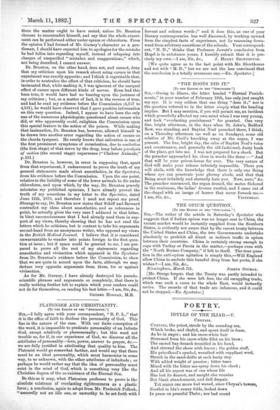PLATONISM AND CHRISTIANITY.
[TO THE EDITOR OF THE " srzcrATon.-1
'Sr ,—I fully agree with your correspondent, " B. P. L.," that it is the office of faith to disclose the personality of God. This lies in the nature of the case. With our finite conception of the word, it is impossible to predicate personality of an Infinite --God, except relatively or phenomenally ; but this need not trouble us, for if, in our experience of God, we discover all the :attributes of personality—love, power, answer to prayer, &c.— we are fully justified in attributing that quality to him. The Platonist would go somewhat farther, and would say that there must be an ideal personality, which must harmonise in some -way, to us unknown, with the other attributes of infinitude ; or perhaps he would rather say that the idea of personality must • exist in the mind of God, which is something very like the 'Christian dogma of the co-existence of the Eternal Son.
Be this as it may, what Platonism professes to prove is the absolute existence of everlasting righteousness as a plastic force ; a conclusion, again to adopt from Mr. Frederick Pollock, "assuredly not an idle one, or unworthy to be set forth with
fervent and solemn words ;" and it does this, as one of your literary contemporaries has well discerned, by working upward from the simplest facts of experience, not by reasoning down- ward from arbitrary assertions of the schools. Your correspond- ent, " M. D.," thinks that Professor Jowett's conclusion from Hegel is in substance yours, I humbly submit that it is pre-
cisely my own.—I am, Sir, &c., J. HENRY SHORTHOUSE. [We quite agree as to the last point with Mr. Shorthouse and not with " M. D.," but we are not the less convinced that the conclusion is a totally erroneous one.—En. Spectator.]


































 Previous page
Previous page